Verghese Kurien — I Too Had A Dream NCERT Solutions | English Poorvi Class 8 - New NCERT PDF Download
Let us do these activities before we read (Page 82)
I. Arrange the worldwide means of communication given below in the timeline provided. Share your answers with your classmates and teacher.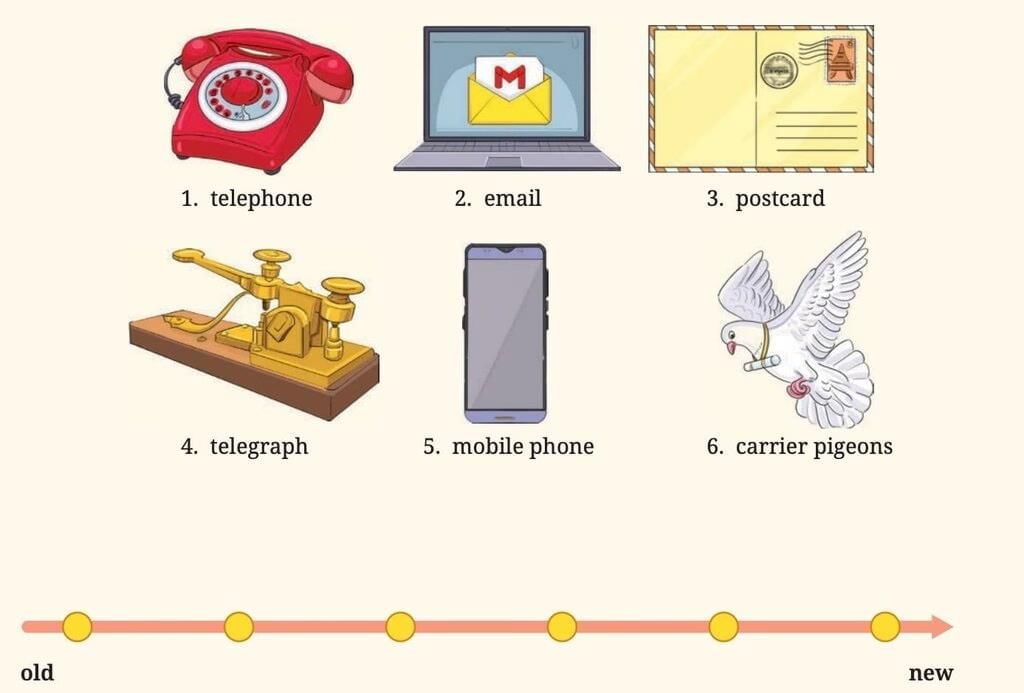
Ans: Carrier pigeons → Telegraph → Postcard → Telephone → Mobile phone → Email
II. Work in pairs and discuss the following things. Share your answers with your classmates and teacher.
1. The reasons for the change in the means of communication over the years.
Ans: Over time, technology has improved, making communication faster and easier. People wanted quicker ways to connect, so old methods like pigeons and postcards were replaced by phones and emails.
2. The means of communication that you prefer to use and the reason for your choice.
Ans: I prefer mobile phones because they are fast, easy to use, and let me call or message anyone instantly.
3. Communication through social media: its benefits and precautions that one should take against its misuse.
Ans: Social media helps share ideas and stay connected. Precautions include not sharing personal information, avoiding strangers online, and checking facts to avoid misinformation.
Let us discuss (Page 85)
A fact is something that can be proven true or false. A fact is not based on people’s beliefs. An opinion, on the other hand, is a belief, feeling or judgement, and can vary from one person to another. An opinion cannot be proven.I. Identify which of the following statements are facts and which are opinions. Share your answers with your classmates and teacher.
1. But speaking on the telephone only gives us an immediate but fleeting joy.
Ans: Opinion (expresses a personal view)
2. I started my working life soon after our country became independent.
Ans: Fact (verifiable event)
3. To be quite honest, service to our nation’s farmers was not the career I had envisioned for myself.
Ans: Opinion (personal thought)
4. I knew I could make a more meaningful contribution by working here in Anand, Gujarat.
Ans: Opinion (personal belief)
5. … values that I saw in my mentor and supporter here in Anand—Tribhuvandas Patel.
Ans: Opinion (subjective observation)
6. Life is a privilege, and to waste it would be wrong.
Ans: Opinion (personal belief)
7. I hope that you, too, will discover, as I did, that failure is not about not succeeding.
Ans: Opinion (personal perspective)
8. … the magnificent ceremony in which the President awarded me the Padma Vibhushan in 1999?
Ans: Fact (verifiable event)
Let Us think and reflect (Page 86)
I. Read the given extracts and answer the questions
(i) Fill in the blank given below by selecting the correct option from the brackets.
When the writer refers to a ‘fast-paced world’, he is speaking of a world where _________________. (Communication happens quicklybut lacks depth/people have more time to write and reflect)
Ans: communication happens quickly but lacks depth
(ii) Select the option that applies correctly to both Assertion (A) and Reason (R).
(A): Writing letters can be treasured and re-read over the years.
(R): Speaking on the telephone provides long-lasting joy.
A. Both (A) and (R) are true, and (R) is the correct explanationof (A).
B. Both (A) and (R) are true, but (R) is not the correct explanationof (A).
C. (A) is true, but (R) is false.
D. Both (A) and (R) are false.
Ans: C. (A) is true, but (R) is false.
Reason: Writing can be treasured, but telephone joy is described as fleeting, not long-lasting.
(iii) Identify whether the statement given below is true or false. The writer feels that letter-writing is a class apart from other kinds of writing.
Ans: True
Reason: the extract emphasises the unique, lasting value of letters.
(iv) Which of the following is the most appropriate title for the given extract?
A. The Rise of Instant Communication
B. The Fleeting Delight of Phone Calls
C. The Lasting Joy of Written Words
D. Living in a Fast-paced World
Ans: C. The Lasting Joy of Written Words.
2. Your grandmother, too, made an important choice. She knew, in those early days, life in Anand could not offer even the simple comforts that we take for granted today. However, she ardently supported my choice to live and work in Anand. That choice of your grandmother to stand by me has given me an everlasting strength, always ensuring that I shouldered my responsibilities with poise.
(i) How can we say that the grandmother shared her husband’s dedication to a greater cause?
Ans: She supported his choice to work in Anand despite the lack of comforts, showing her commitment to his mission.
(ii) Complete the following with the correct option from the two given in brackets. The fact that the writer (grandfather) praises his wife tells us that he _____________________ (truly values/quietly accepts) her role in his life.
Ans: The fact that the writer (grandfather) praises his wife tells us that he truly values her role in his life.
(iii) Complete the following sentence with the correct option from those given below. Based on the information in the extract, we can infer that the grandmother had all of the following traits EXCEPT ____________.
A. encouraging
B. understanding
C. comforting
D. thoughtful
Ans: Based on the information in the extract, we can infer that the grandmother had all of the following traits except C. comforting as the extract mentions support and strength, not specifically comforting.
(iv) Select the phrase that conveys— ‘showed grace under pressure and carried out my duties with dignity and confidence’.
Ans: The phrase that conveys “showed grace under pressure and carried out my duties with dignity and confidence” is “shouldered my responsibilities with poise”.
II. Answer the following questions.
1. What event does Dr. Kurien refer to when he mentions receiving the Padma Vibhushan?
Ans: Dr. Kurien refers to the ceremony held in Delhi in 1999, where he was awarded the Padma Vibhushan by the President of India. He recalls how his grandson proudly wore the medal and innocently asked if he could keep it.
2. How did Dr. Kurien’s decision to join the cooperative in Anand affect his life?
Ans: Dr. Kurien’s decision to join the small cooperative of dairy farmers in Anand completely transformed his life. Though he had other career options like metallurgy, the army, or going abroad, he chose to work for the farmers. This decision led him to a life of service, brought him national recognition, and allowed him to contribute meaningfully to the development of rural India.
3. Dr. Kurien’s decision to work in Anand reveals his values and sense of duty. Explain.
Ans: Dr. Kurien’s choice to work in Anand showed his deep sense of responsibility toward nation-building. He gave up a potentially lucrative and comfortable life to serve poor farmers. His values of integrity, honesty, humility, and dedication to the common good guided his decision. He believed in making a meaningful contribution to society rather than pursuing personal success.
4. Why did Dr. Kurien write the letter to his grandson?
Ans: Dr. Kurien wrote the letter to his grandson Siddharth to share his life experiences, values, and the reasons behind his life choices. He hoped that the letter would serve as a source of inspiration and wisdom, not just now but also in the future when his grandson could reflect on it more deeply. He wanted to pass on the importance of service, responsibility, and values to the next generation.
5. According to Dr. Kurien, “life is a privilege and it is wrong to waste it”.What is your opinion on this?
Ans: (Example opinion – you can personalise it as needed)
I agree with Dr. Kurien. Life gives us countless opportunities to learn, grow, and help others. If we waste our talents or ignore chances to do good, we miss out on making our lives meaningful. Using our abilities to contribute to the betterment of society gives life its true value and purpose.
6. What message does Dr. Kurien want to convey about selfless service and its long-term impact on society?
Ans: Dr. Kurien emphasises that selfless service, even if modest, has the power to bring about lasting positive change in society. He believed that real success lies not in personal gain but in contributing to the common good. By dedicating oneself to helping others, one can build a stronger, more compassionate nation and inspire future generations to continue that service.
Let us learn (Page 88)
I. Replace the underlined words in each sentence with the correct synonym from the box. You may refer to a dictionary.
Ans: He received the award in a splendid ceremony.
2. I felt a fleeting joy when I received the appreciation for my song.
Ans: I felt a momentary joy when I received the appreciation for my song.
3. With today’s instant communication, we can share information across the world in seconds.
Ans: With today’s swift communication, we can share information across the world in seconds.
4. Our school focuses on the core values—collaboration, innovation, and unity.
Ans: Our school focuses on the essential values—collaboration, innovation, and unity.
5. My teacher’s advice on time management is a valuable reminder of the importance of planning.
Ans: My teacher’s advice on time management is a useful reminder of the importance of planning.
6. Reading books and listening to music can give abiding pleasure that will last forever.
Ans: Reading books and listening to music can give lifelong pleasure that will last forever.
II. Match the expressions from the text in Column 1 with their meanings in Column 2.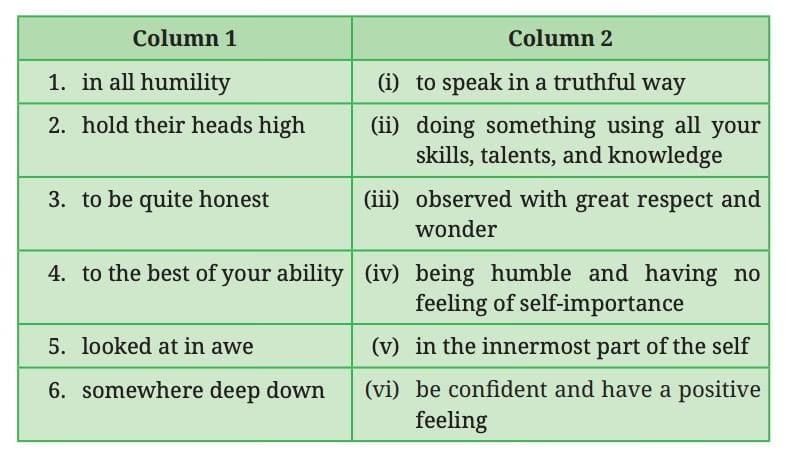
Ans: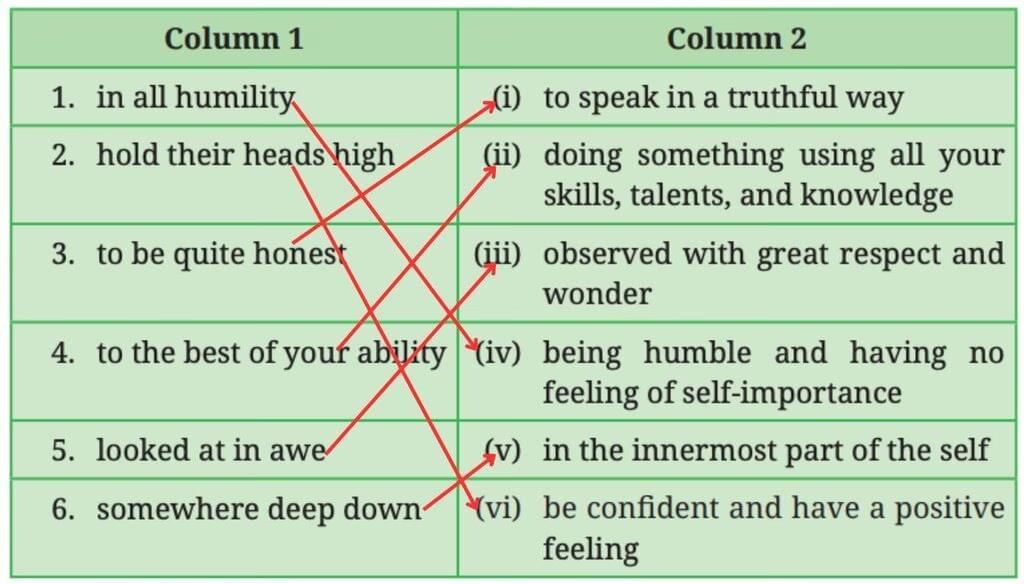
III. Make as many words as you can out of the following words. One example has been done for you
1. community — city, toy, tune, unity, mutiny, cot
2. important
3. magnificent
4. satisfied
5. generation
6. achievement
Ans:
1. community — city, toy, tune, unity, mutiny, cot
2. important — part, port, ant, rant, tip, trap
3. magnificent — gift, neat, fan, cane, cent, game
4. satisfied — sad, fade, side, date, site, idea
5. generation — gate, rate, near, tone, rent, giant
6. achievement — achieve, name, time, heat, team, event
IV. Let us play a word game—antakshari.
1. Write the synonym of the word according to the clues given below.
2. For example, the synonym of the first word, ‘IMPORTANT’, ends with the letter ‘T’. The synonym of the second word begins with ‘T’, ‘TROUBLE’.Then write the synonym of the third word starting with the letter ‘E’.
3. Now, continue with the word game.

(i) major (synonym)
(ii) problem (synonym)
(iii) uneven (antonym)
(iv) related to post office
(v) our moral duty
(vi) related to time
(vii) prosperous (synonym)
(viii) related to being alive
Ans: 
V. Study the highlighted punctuation marks in the following sentences from the text.
1. … but that you should not be satisfied in merely keeping my awards—the challenge before you was to earn your rewards for the work that you did in your lifetime.
2. Writing—even if it is a letter—not only conveys our present concerns and views of the events taking place around us, but it becomes a possession.
The highlighted punctuation is a long dash that can be used to link words or numbers or to create a pause in a sentence. There are two main types:the shorter en dash (–) and the longer em dash (—). 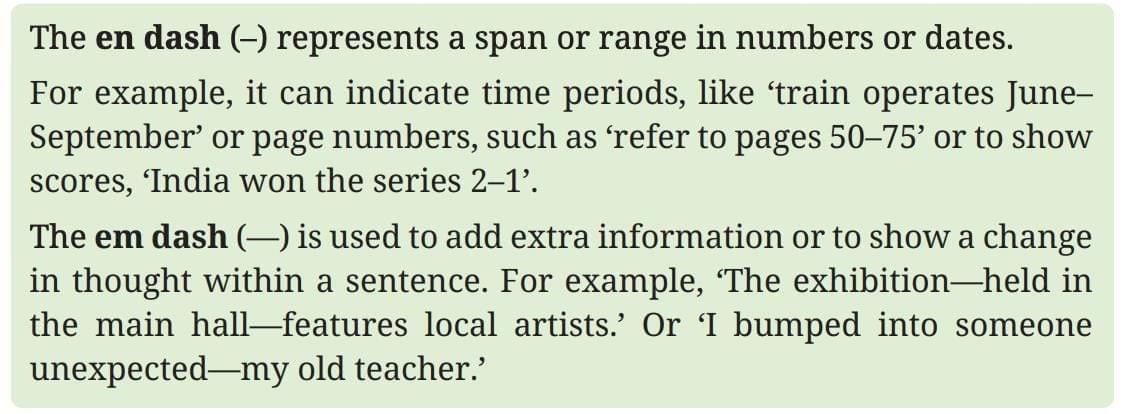 Note: Do not add spaces around the dash and avoid overusing them.
Note: Do not add spaces around the dash and avoid overusing them.
Read the sentences below and insert either an em dash (—) or an en dash (–) suitably.
(i) The conference will be held from March 15 March 20.
Ans: The conference will be held from March 15–March 20.
(en dash for range)
(ii) I have lived in Kanpur Raipur for five years now.
Ans: I have lived in Kanpur—Raipur for five years now.
(em dash for change in thought)
(iii) The artist known for her vibrant paintings will be showcasing herwork in Guwahati.
Ans: The artist—known for her vibrant paintings—will be showcasing her work.
(em dash for extra information)
(iv) The scores for the final match were 2 3.
Ans: The scores for the final match were 2–3.
(en dash for scores)
(v) My favourite snacks samosas, pakoras, and jalebis are all from India.
Ans: My favourite snacks—samosas, pakoras, and jalebis—are all from India.
(em dash for extra information)
(vi) The train journey from Belagavi Bengaluru takes less than tenhours.
Ans: The train journey from Belagavi—Bengaluru takes less than ten hours.
(em dash for change in thought)
(vii) I just finished reading the book it was absolutely amazing!
Ans: I just finished reading the book—it was absolutely amazing!
(viii) The event will take place on September 1 September 5.
Ans: The event will take place on September 1–September 5.
(en dash for range)
VI. Study the highlighted words in the following sentences from the text.
1. We told you that, of course, this medal was yours as much as it was mine…
2. …who were trying to gain control over their lives.
3. I have always emphasised that it’s a recognition of the achievements of many people…
In the given sentences, ‘yours’ and ‘theirs’ indicate possession—something belonging to you and them, respectively. But, ‘it’s’ does not indicate possession rather is the contracted form of ‘it is’.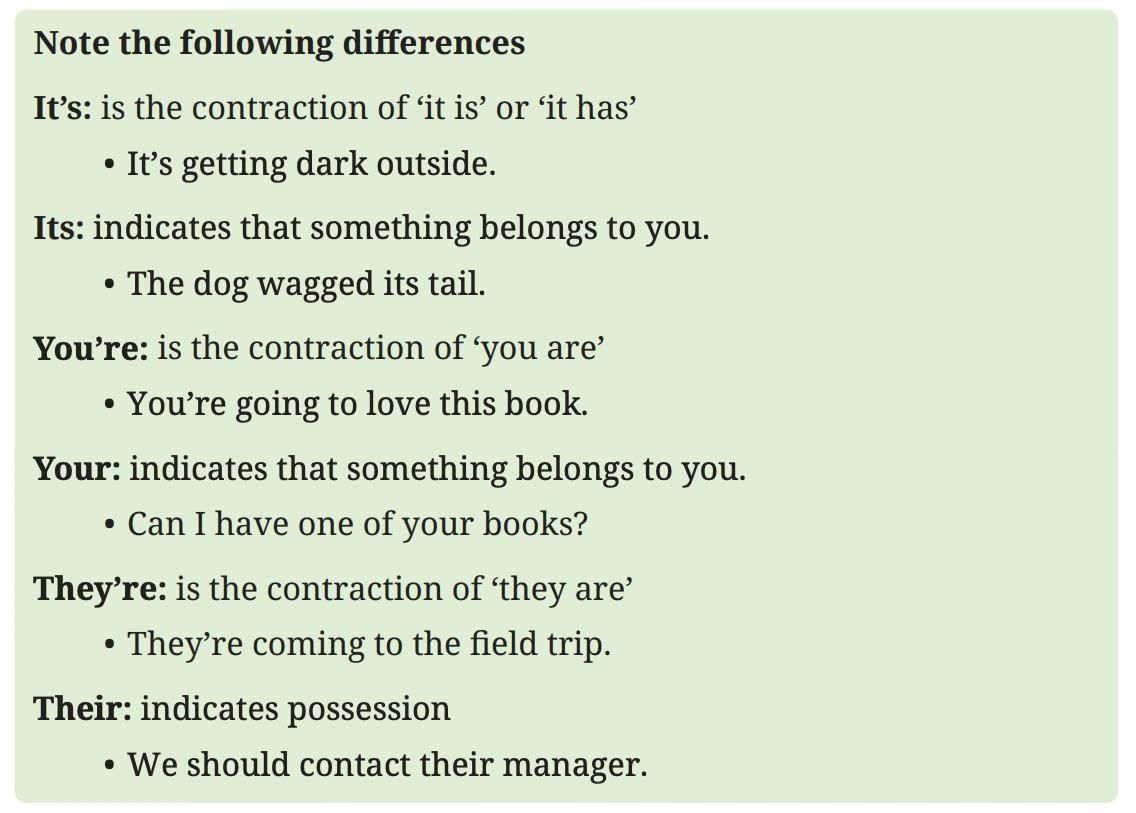 Fill in the blanks by choosing the correct word from the options given in the brackets.(i) Please remember to bring ___________ (your/you’re) assignment book.
Fill in the blanks by choosing the correct word from the options given in the brackets.(i) Please remember to bring ___________ (your/you’re) assignment book.
Ans: Please remember to bring your assignment book.
(ii) The team celebrated ___________ (their/they’re) victory after the match.
Ans: The team celebrated their victory after the match.
(iii) ___________ (its/it’s) important to stay hydrated during the hot summer days.
Ans: It’s important to stay hydrated during the hot summer days.
(iv) I can’t believe ___________ (your/you’re) going to the mango festival today.
Ans: I can’t believe you’re going to the mango festival today.
(v) The students said ___________ (they’re/their) excited for the field trip tomorrow
Ans: The students said they’re excited for the field trip tomorrow.
(vi) The tree lost ___________ (its/it’s) leaves in the winter.
Ans: The tree lost its leaves in the winter.
VII. Read the following phrases from the text.
1. In today’s fast-paced world
2. On the telephone
3. With great, abiding pleasure
4. In the chapters that follow
5. At a certain time
6. With equal respect and love
The given phrases are Prepositional Phrases. Now, complete the following sentences with suitable prepositional phrases.
Now, complete the following sentences with suitable prepositional phrases.
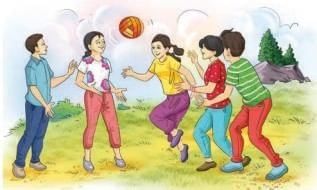 (i) The children played happily in ___________________________________.
(i) The children played happily in ___________________________________.
Ans: The children played happily in the park.
(ii) Nisha placed the vase on ___________________________________.
Ans: Nisha placed the vase on the table.
(iii) We discussed the project in ___________________________________.
Ans: We discussed the project in the classroom.
(iv) Preethi found the lost book under ___________________________________.
Ans: Preethi found the lost book under the bed.
(v) The cat slept on ___________________________________.
Ans: The cat slept on the mat.
VIII. Rearrange the following jumbled words and phrases into meaningful sentences.
1. barked/at the strangers/the dog/loudly/the house/walking by
Ans: The dog barked loudly at the strangers walking by the house.
2. wrote/my classmate/during the/a story/summer vacations
Ans: My classmate wrote a story during the summer vacations.
3. enjoyed/under the trees/they/by the lake/a picnic
Ans: They enjoyed a picnic under the trees by the lake.
4. in his/grandfather’s room/hung/he/the painting
Ans: He hung the painting in his grandfather’s room.
5. studied/with great determination/for/students/the/exam
Ans: The students studied with great determination for the exam.
Let us listen (Page 93)
I. You will listen to the passage about Evelyn Glennie’s journey in overcoming her hearing loss through music and turning a physical disability into a success story. After listening, match the words given in Column 1 with their meanings given in Column 2.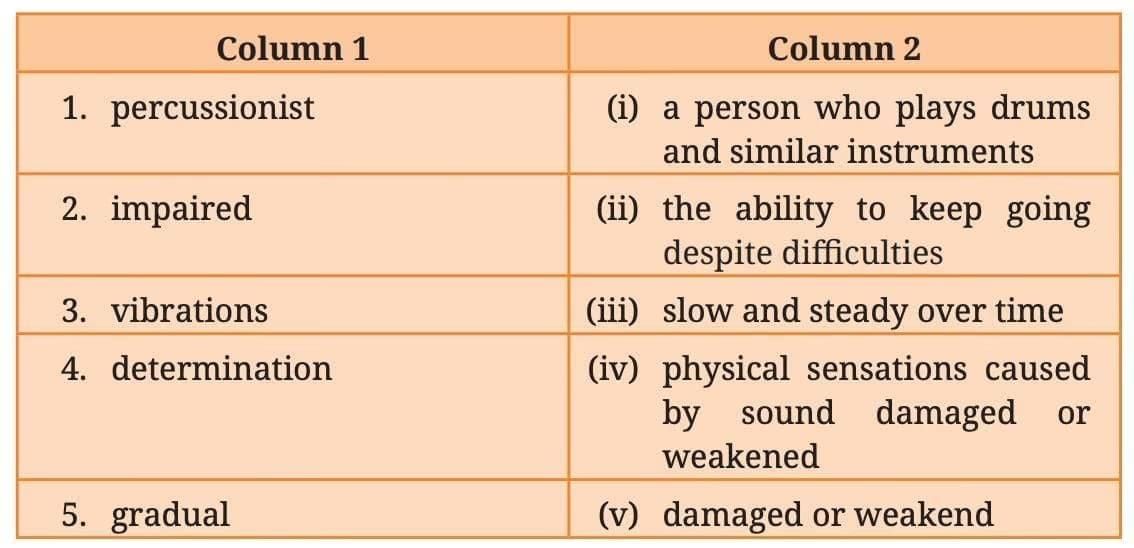
Ans:
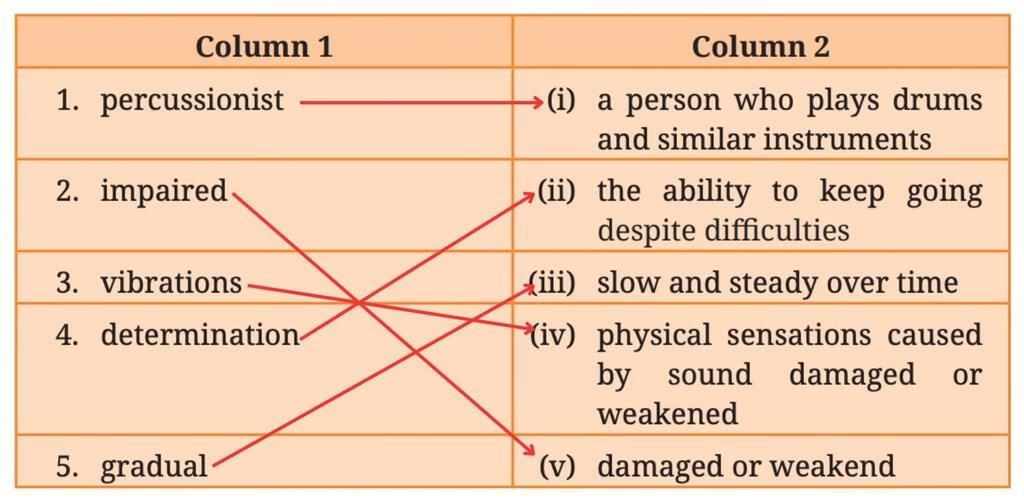
II. Listen to the passage once again and state whether the statements given below are true or false.
1. Evelyn Glennie became deaf suddenly.
Ans: False
her hearing loss was gradual.
2. Her headmistress ignored the signs of her hearing loss.
Ans: False
Teachers typically notice such signs.
3. Ron Forbes was a percussionist who helped Evelyn.
Ans: True
4. Evelyn used her skin and bones to sense music.
Ans: True
5. She gave up on music after her diagnosis.
Ans: False
she continued her music career.
III. Answer the following questions in one or two words.
1. How did Evelyn turn her disability into a strength?
Ans: Sensing vibrations
2. What role did Ron Forbes play in her life?
Ans: Mentor
3. What lessons can we learn from Evelyn’s story about how to treat others who have different abilities or challenges?
Ans: Empathy, support
Let us speak (Page 94)
I. Read the highlighted word in the following sentence from the text.
That common good will present itself to you in many forms every day.
The highlighted word is pronounced with the stress on the second syllable.
PreSENT (verb) the stress is on the second syllable.
PREsent (noun), the stress is on the first syllable.
Now, read aloud the given words with the correct syllable stress according to the part of speech given in the brackets.
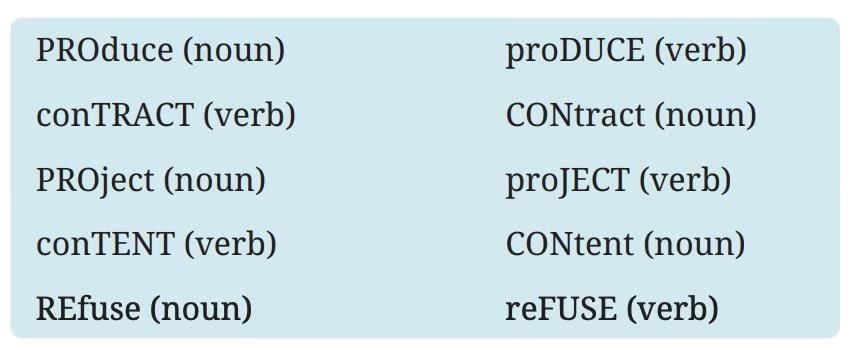 Ans: Words with “Zhuh” sound (-sure ending):
Ans: Words with “Zhuh” sound (-sure ending):
measure, leisure, reassure, enclosure, exposure, composure
Words with “Shuh” sound (-sure but sharp ‘sh’):
pressure, fissure, ensure, unsure 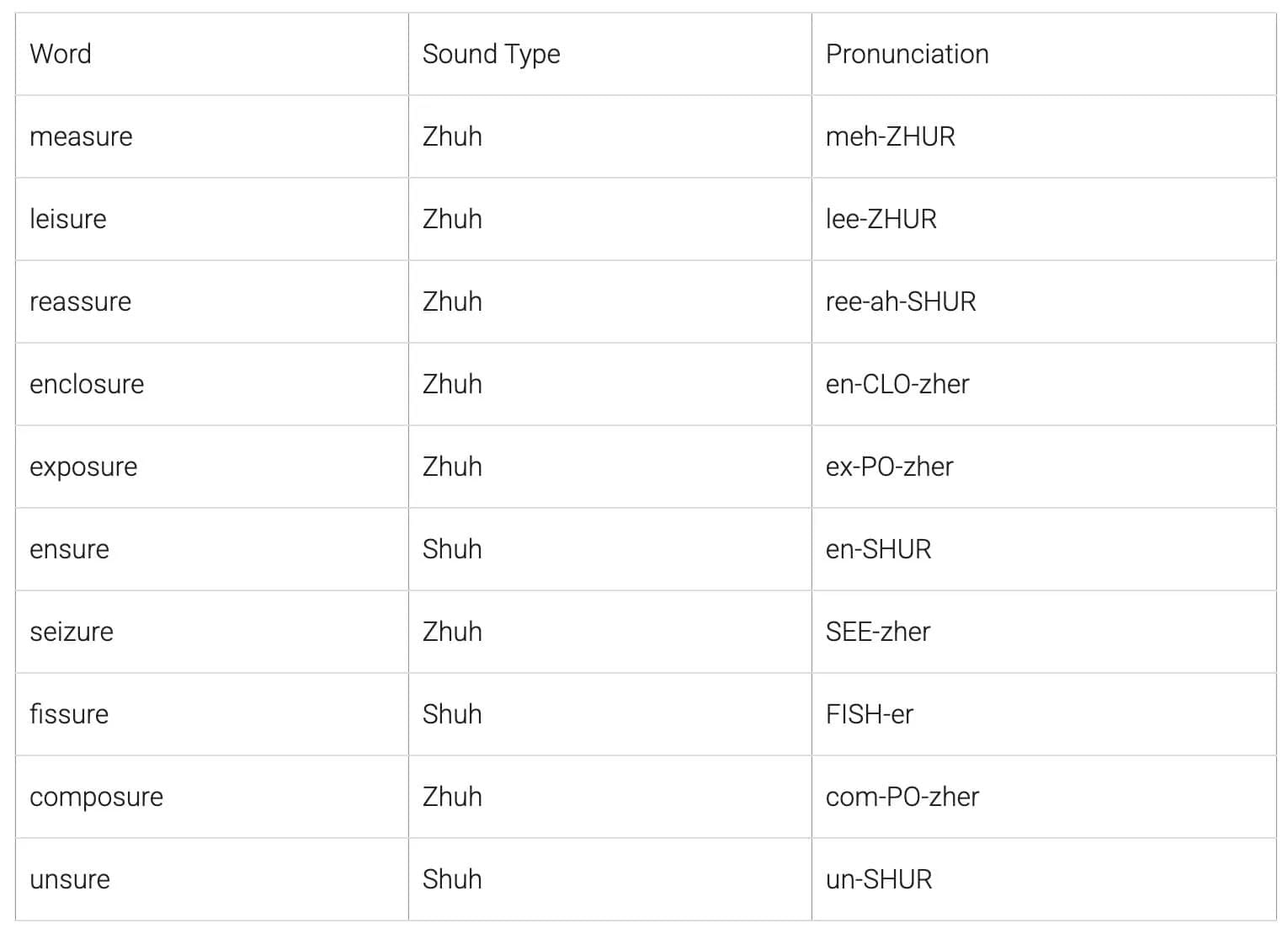
II. Read the highlighted words in the following sentence from the text.
…but it becomes a possession that can be treasured and re-read over the years, with great, abiding pleasure.
treasure [treh-Zhuh]
pleasure [pleh-Zhuh]
In the highlighted words, -sure has a ‘Zhuh’ sound.
There are some words which end in -sure, but have a ‘shuh’ sound as in pressure [preh-shuh].
Now, read aloud the words given below with the ‘shuh’ or ‘zhuh’ sound.
“zuhh” sound: measure, leisure, reassure, seizure
“shuh” sound: pressure, exposure, ensure, enclosure, fissure, unsure
III. Pausing and chunking are techniques used when speaking to organise information for the listener. Speakers can split what they say into smaller segments—either individual words or groups of words—to convey ideas or emphasise key points clearly.
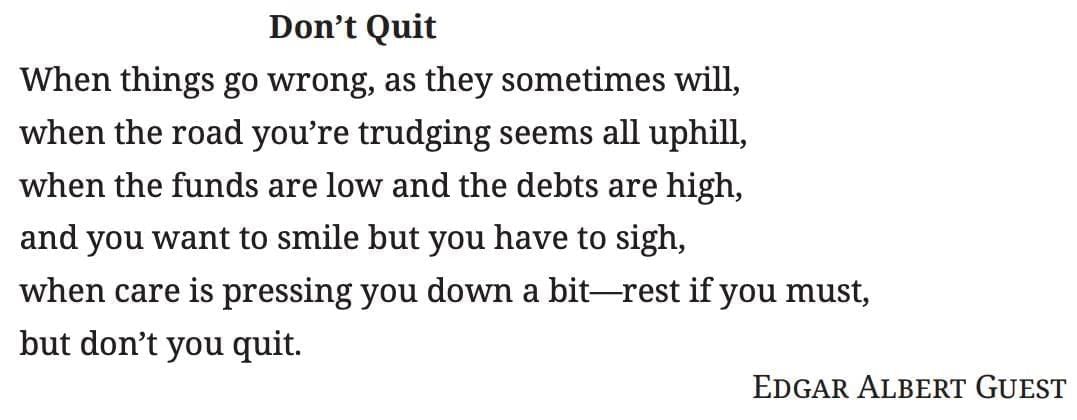 Now, read the lines of the poem once again by taking a shorter pause (/)or a long pause (//). Notice which version is easier for a listener to follow and understand.
Now, read the lines of the poem once again by taking a shorter pause (/)or a long pause (//). Notice which version is easier for a listener to follow and understand.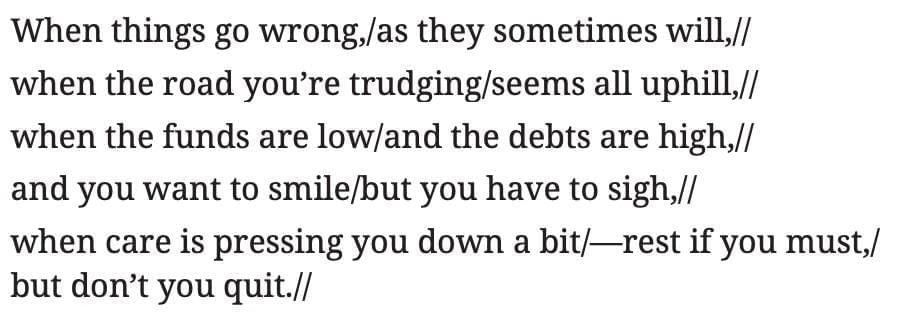 Have you listened to this song in Hindi or in your language? Share with your classmates and teacher.
Have you listened to this song in Hindi or in your language? Share with your classmates and teacher.Ans:
When things go wrong,/as they sometimes will,//
when the road you’re trudging/seems all uphill,//
when the funds are low/and the debts are high,//
and you want to smile/but you have to sigh,//
when care is pressing you down a bit/
—rest if you must,/
but don’t you quit.//
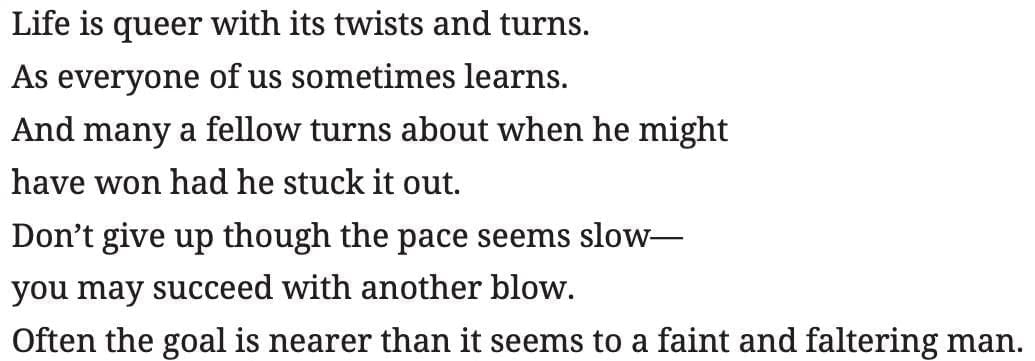
Life is queer with its twists and turns, /
As everyone of us sometimes learns. / /
And many a fellow turns about /
when he might have won /
had he stuck it out. / /
Don’t give up / though the pace seems slow— /
you may succeed / with another blow. / /
Often the goal is nearer than it seems /
to a faint and faltering man. / /.
Let us write (Page 95)
I. Write a letter to your grandparents thanking them for the valuable lessons they have taught you. Include how their wisdom has shaped your values and behaviour in life.
1. Thank them for teaching you important lessons, sharing stories, or helping others in the neighbourhood.
2. Share how their actions inspire you to contribute to the betterment of the society.
Ans:
Your Address
[City, State, ZIP Code]
1 August 2025
Dear Grandparents,
I want to thank you for the wonderful lessons you’ve taught me. Your stories about honesty and hard work inspire me to be a better person. When you helped our neighbor with their garden, it showed me how to care for others. Your wisdom teaches me to be kind and work for the good of society, like helping clean our park. I promise to use these values to make a difference in my community.
With love,
[Your Name]
Let us explore (Page 96)
I. The White Revolution led to an increase in milk production in India primarily due to the efforts of Dr. Verghese Kurien. Therefore, he is known as ‘the Milkman of India’.
The Green Revolution in India introduced high-yielding varieties of wheat and rice. It was initiated by Dr. M.S. Swaminathan. He was awarded the Padma Shri in 1967, Padma Bhushan in 1972, Padma Vibushan in 1989, and Bharat Ratna in 2024.
The Blue Revolution focused on increasing fisheries production and productivity in India. This initiative was led by Dr. Hiralal Chaudhuri.
In groups of four, research more information about these revolutions. Share your findings with your classmates and teacher.
Ans: Green Revolution: Led by Dr. M.S. Swaminathan, it introduced high-yielding wheat and rice to increase food production in India during the 1960s-70s.
Blue Revolution: Led by Dr. Hiralal Chaudhuri, it focused on increasing fish production through better farming techniques in the 1960s-80s.
II. Vocational training for people in rural regions is provided by the JanShikshan Sansthan (JSS), under the Ministry of Skill Development and Entrepreneurship, Government of India. The objective of JSS is to economically uplift the rural population by imparting essential skill-based training. This enables local trades to grow and creates new opportunities for the people in the region.
Find out more about JSS with the help of the link given: https://jss.gov.in/staticPage
Ans: JSS provides skill-based training to rural people to help them earn a living. It teaches skills like tailoring, farming, and crafts, creating job opportunities.
III Financial Literacy
Read the passage and discuss the questions given below. Financial literacy is an essential lifelong skill that should be taught to children from an early age. Preparing children with financial literacy skills is an investment in their future well-being. By imparting an understanding of money, saving, budgeting, and wise spending, we empower them to navigate the financial world with confidence as they grow up. Whether it is managing a cooperative society, a start-up, or a household budget, financial literacy is an ongoing learning process that evolves as children grow and their understanding deepens. An introduction to concepts of saving, budgeting, investing, and responsible spending equips them with essential life skills. Children learn best through practical examples. Real-life situations help them understand the value of money and the importance of making wise financial choices. Thinking critically before spending helps cultivate responsible habits. The concept of saving and investing can be explained through relatable examples, such as planting seeds that grow into trees bearing fruit. As children grow older, they will learn to differentiate between needs and wants, compare prices before making a purchase and understand the importance of financial literacy.
Discuss in groups.
1. The importance of learning about money and saving from a young age. Share one example of it.
2. Imagine you received some money as a gift. How would you decide whether to save it, spend it, or invest it? What factors would you consider?
3. If you were in charge of planning a small event at school with a limited budget, how would you manage the money?
4. Why is financial literacy important for everyone?
Ans:
- Importance of learning about money: Learning about money helps kids save and spend wisely. Example: Saving pocket money for a toy teaches planning.
- Deciding what to do with gift money: I’d save half for future needs, spend some on a book, and invest in a piggy bank. I’d consider my needs and goals.
- Managing a school event budget: I’d list expenses like food and decorations, prioritize needs, and avoid overspending to stay within the budget.
- Why financial literacy is important: It helps everyone make smart money choices, avoid debt, and plan for the future.
|
58 videos|435 docs|57 tests
|
FAQs on Verghese Kurien — I Too Had A Dream NCERT Solutions - English Poorvi Class 8 - New NCERT
| 1. What is the significance of Verghese Kurien's contributions to the dairy industry in India? |  |
| 2. How did Verghese Kurien's approach to cooperative dairying differ from traditional methods? |  |
| 3. What challenges did Verghese Kurien face while implementing the dairy cooperative model? |  |
| 4. In what ways did Verghese Kurien's work impact rural development in India? |  |
| 5. How does Verghese Kurien's legacy continue to influence the dairy industry today? |  |






















